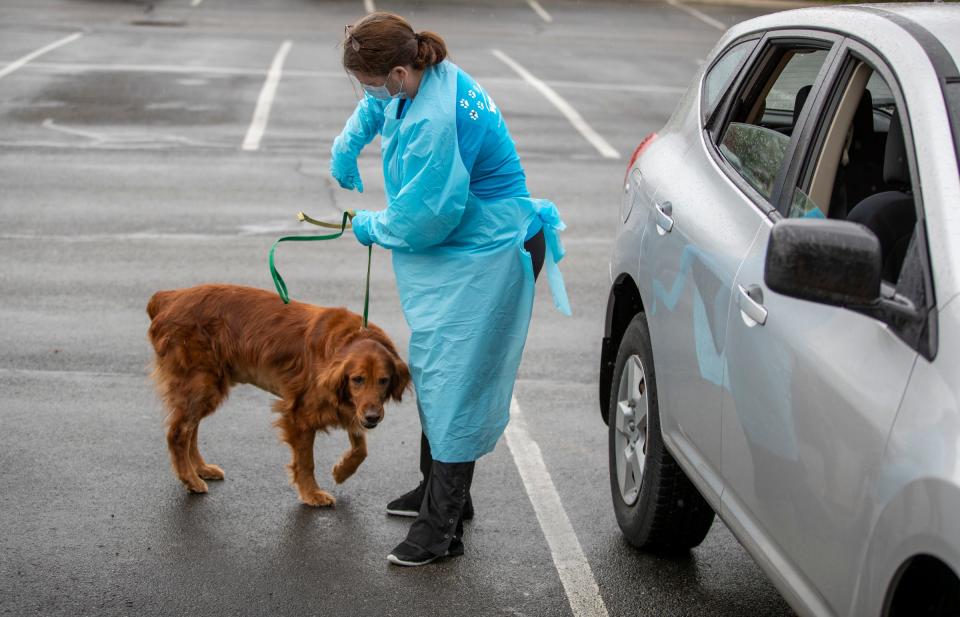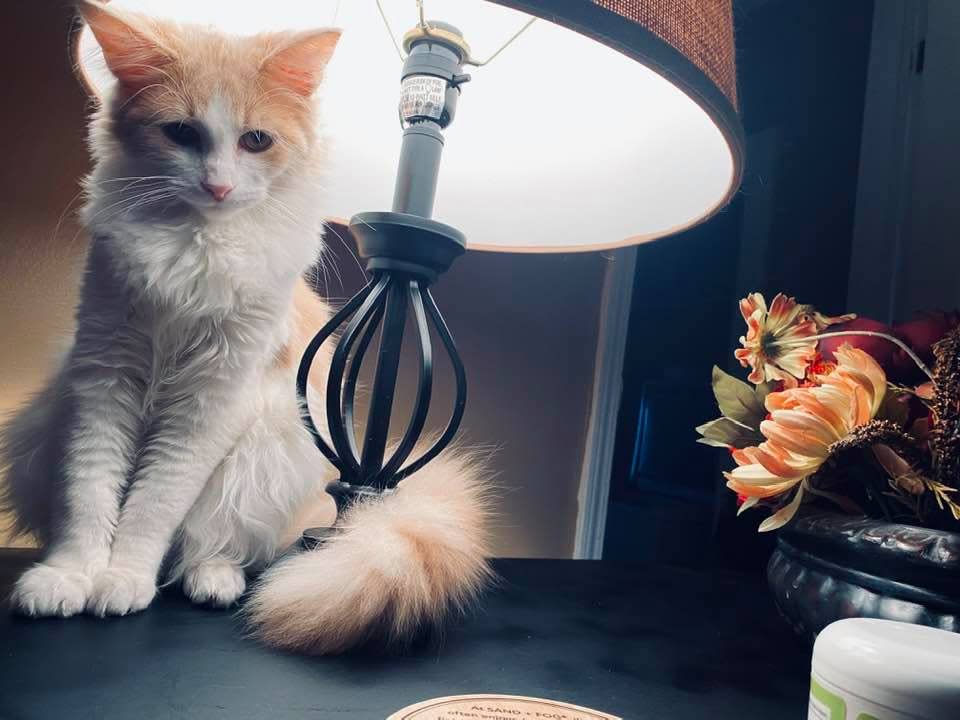'Dogs and cats are getting into more trouble': How coronavirus quarantine is affecting your pet
INDIANAPOLIS – A giddy goldendoodle, smiling from curly ear to curly ear, is waiting for his turn in the parking lot of McCordsville Veterinary Hospital, trying to poke his big black nose through the crack in the window of his owner's SUV.
Meanwhile, a sleek black pointer trots out the hospital's front door, his handler toting a bag of medicine to deliver to his mom waiting in the parking lot.
Car after car pulls in, here to get treatments for furry loved ones for issues veterinarians say those pet owners probably didn't notice before.
But as people have been hanging out at home due to the coronavirus pandemic, they are noticing them now.
"They're spending more time with their pets and seeing things. 'You know, he looks a little funny to me. His breath smells a little funny. He's eating funny,'" said Michael Graves, veterinarian, owner and CEO of Indianapolis-based Pet Wellness Clinics. "People tend to be noticing things with their pets a little quicker, things they would have overlooked before."
More fighting, getting into trouble
The good news for animals is they are getting much-needed medical attention, said Anne Browne, an emergency veterinarian at VCA, Advanced Veterinary Care Center in Fishers.
"Some of the chronic problems that people have been putting off getting care for," she said, "they're home, they have time and they're getting some of the care that has been sort of lingering in the pets for weeks and months."
Some of the medical issues veterinarians are seeing, however, are directly related to the COVID-19 quarantine. Anxiety, injuries, more fights.
"Dogs and cats are getting into more trouble," said Browne. "They're not necessarily confined so they're having more things that they can do. People's animals are actually getting in more disagreements."
Beyond that, dogs are out running, jumping and playing with owners in the backyard.
"We are seeing injuries from that," said Randy Cross, medical director and a neurologist at VCA, which features a 24/7 emergency room, adding that beyond the physical health of animals are the mental issues.
After all, pets are being forced to put up with their humans.
Dogs and cats used to having the run of their houses are having to co-habitate all day and night with their owners. As much as they love those scratches and pats, that can be stressful, said Cross.
"There is anxiety in animals because you are changing their entire schedule and environment," he said. "They're used to you going to work and you being away and not being there, but now they're sharing (the house) all day."
That can mess up their sleep patterns and induce unusual behavior. Some animals even act out, using the bathroom outside of the litter box or getting cranky.
"This is all a big change for them, too," Cross said.
Different ways of treating clients
According to the American Veterinary Medical Association, many practices saw revenue decline by an average of 20% in March. However, vets in many places, including Indiana, are now seeing recovery.
"I follow the revenue that comes in and right now it's pretty much flat, which is pretty incredible considering..." said Cross. Considering the coronavirus-induced recession.
Aaron Smiley said the most noticeable change for veterinarians has been how they see their patients.
"It's not that they're busier," said Smiley, who practices in Anderson and is the president of the Indiana Veterinary Medical Association. "It's different."
Telemedicine, curbside car visits and, rarely, allowing clients inside as their animals are treated.

At McCordsville, owners are asked to bring their animals inside the first set of doors, where they are picked up by a staff member. After examining the pet, a doctor calls the client, who remains in their car, to discuss treatment.
In other cases when possible, care can be done virtually, with a telephone call — especially if the animal has recently been seen — or by video conference.
"The biggest change and disappointment in some ways is our lack of interaction with the clients," said Cross. "We still get the patient interaction, but it's amazing we forget just how much personal interaction occurs by seeing someone and watching them."
It can be tough and frustrating not having face-to-face contact with the pet owners, Cross said, especially when something serious is wrong with the pet.
That has been the hardest part for Brenda Long, a receptionist at VCA, whose job during coronavirus is to retrieve pets from cars and take them into the hospital.

"It's very different. Before they were able to come into the building, they felt safe because they had the pet with them, they trusted the doctor because they did things with the client," said Long. "Now they're having to sit out there and wonder."
Unless a pet is being put to sleep or critically ill, owners are asked to stay in the car. Long has had to look out to those cars and see tears flowing.
"People are crying in their cars and we're taking Kleenexes out to them that are put in plastic bags so they can have something to cry into," she said. "You can't hug them. It's a sad situation for sure. It's hard on the client; it's hard on us."
On a happier note, though, is the exhaustion, she said. Long spends most of her days wrestling those happy dogs into the hospital. Dealing with hissing cats. And just doing what she's always loved.
Being there for animals.
"After this is all over," said Smiley. "We should remember these staff and veterinarians who were on the front line to keep pets healthy during this. Remember the compassion they showed."
Follow Dana Benbow on Twitter: @DanaBenbow.
This article originally appeared on Indianapolis Star: Coronavirus and pets: How quarantine is changing your pet's life

